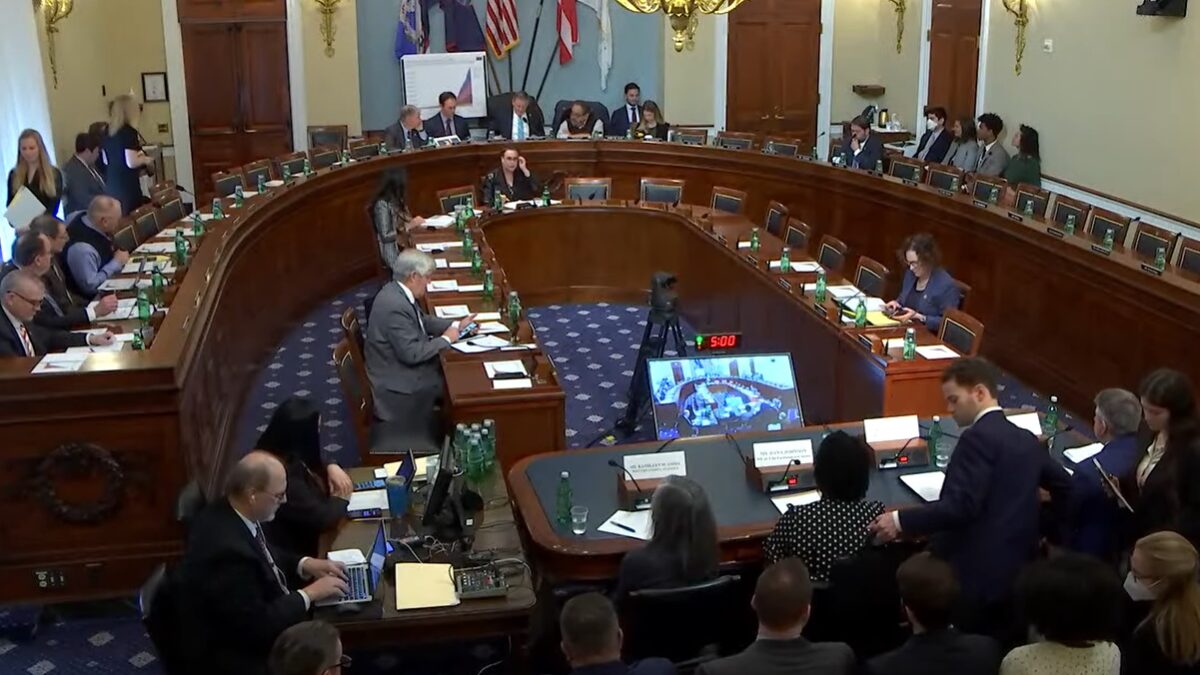Lawmakers on both sides of the aisle shared frustration over the nation’s archaic permitting process Wednesday at a House Natural Resources Committee hearing on energy and minerals.
Republicans fumed the incumbent process established under the National Environmental Policy Act (NEPA) impedes progress on oil and gas production while Democrats complained the regulatory regime stands in the way of wind and solar projects. Everyone, seemed frustrated by the regulatory regime’s impediment to producing critical minerals for all of the above.
“I welcome my Republican colleagues interested in permitting reform,” said Michigan Democrat Rep. Debbie Dingell, whose late husband wrote the legislation known as the Magna Carta of environmental law in the 1960s. “We need an honest conversation about permitting and the implementation of NEPA in the 21st century…We can accelerate deployment by becoming much more efficient and predictable [with] clear timelines.”
Current timelines have jeopardized national security by leaving America behind foreign adversaries developing natural resources while domestic enterprises are left with a headache over pending approvals. Minnesota Rep. Pete Stauber, whose district is home to a vast copper and cobalt reserves cut off from extraction by the Biden administration last month, complained that companies hoping to mine in his state have been waiting decades for permits.
“In the Duluth complex in northern Minnesota, the biggest copper and nickel find in the world, which Joe Biden just banned mining in my district, there’s a company in its 20th year of permitting and then there’s another one within 9 years of permitting process,” Stauber said. “It’s just unfortunate, especially if we want to hold ourselves to the highest environmental and labor standards, we mine in America.”
The status quo benefits liberal lawmakers allied with left-wing causes, however, and Republicans said nothing about it.
Last summer, the Biden administration reintroduced “sue and settle” practices brought to a halt under President Donald Trump. The practice refers to when lefty environmental groups allied with the government position on an issue present a legal challenge to a project and, in turn, voluntarily settle. The preferred policy outcome is implemented as a result under the cover of the courts, and liberal interest groups pocket a lucrative profit from the taxpayer.
“It takes 16 years now to permit a new mine,” Rick Whitbeck, the Alaska director for Power the Future, told The Federalist. “Part of the process — at least from the environmental activists — is to ‘litigate and make them wait,’ where they continuously file legal motions, find a friendly judge, and delay the permitting process.”
In July, President Joe Biden’s Department of the Interior took an axe to her predecessor’s order and scrubbed the agency website placing settlements and consent decrees in public view.
The move reintroduces a signature feature of the kind of Beltway swamp activity that ushered President Donald Trump into the White House six years ago. Lawmakers, however, remained silent on the reintroduction of “sue and settle” cases despite industry leaders complaining again and again that environmental litigation is crippling the country Wednesday.
“Groups are using NEPA to slow down wind and solar as well,” said Kathleen Sgamma, who represents the oil and gas industry as president of the Western Energy Alliance.
Later in the hearing, GOP Committee Chairman Bruce Westerman asked Sgamma the “one thing the committee needs to focus on in regulatory reform.”
“I would suggest looking at the litigation angle and working to give judges guidance that endless NEPA, endless analysis is not the intent of NEPA,” Sgamma said.
“Could you be just a little more specific on NEPA?” Westerman asked. “What is it specifically about NEPA that could make it work better?”
Sgamma referenced the endless litigation that can effectively kill a project.
When you look at litigation, it’s really easy to find some analysis in a 5,000 page document that could have been done better. And it’s supposed to be done on the best available information, not waiting years and years for more information to come in or requiring the project proponent to go off and do a science project and come back 10 years later. So I would say constraining it to what the focus is on the impacts on the ground of that project. Not hypothetical impacts 10 years into the future.
Republicans had a prime opportunity to highlight the administrative return of sue and settle. Instead, the hearing was a four-hour regurgitation of talking points on how Biden was bad to shut down the Keystone Pipeline.









